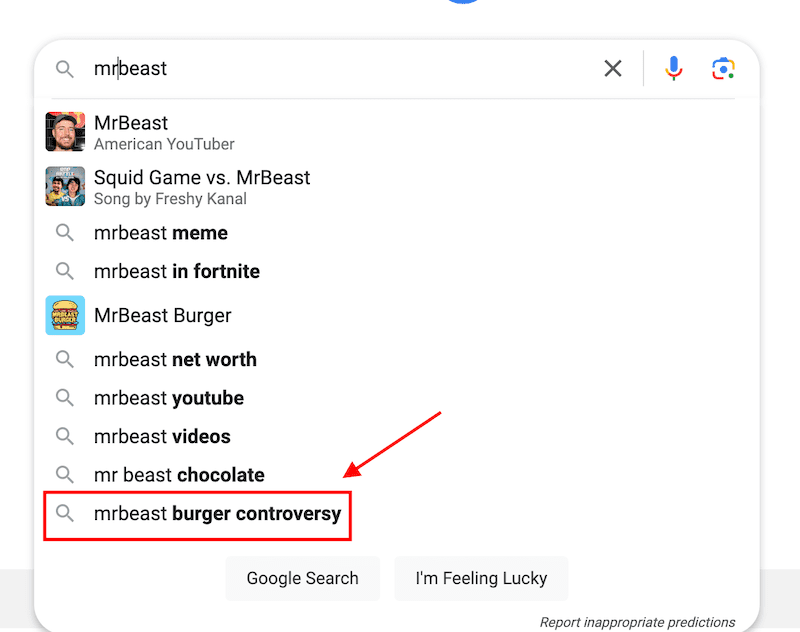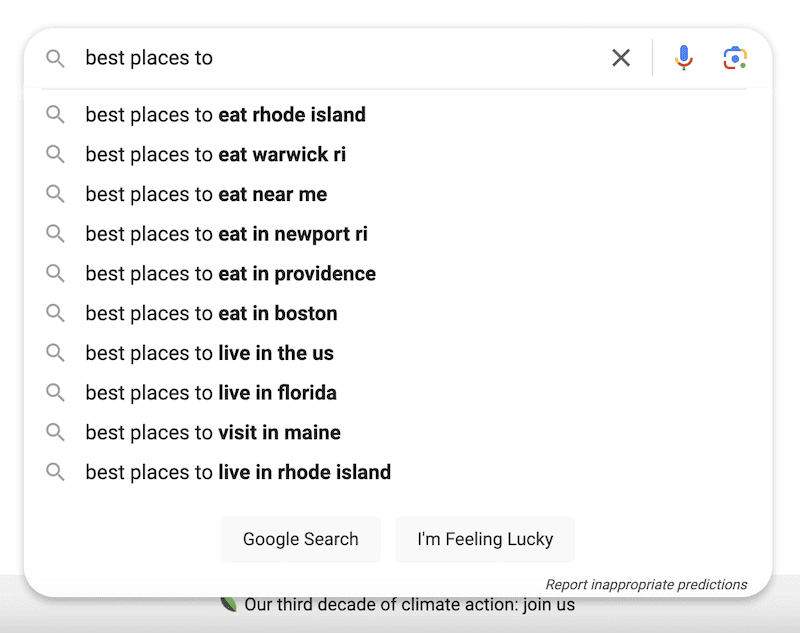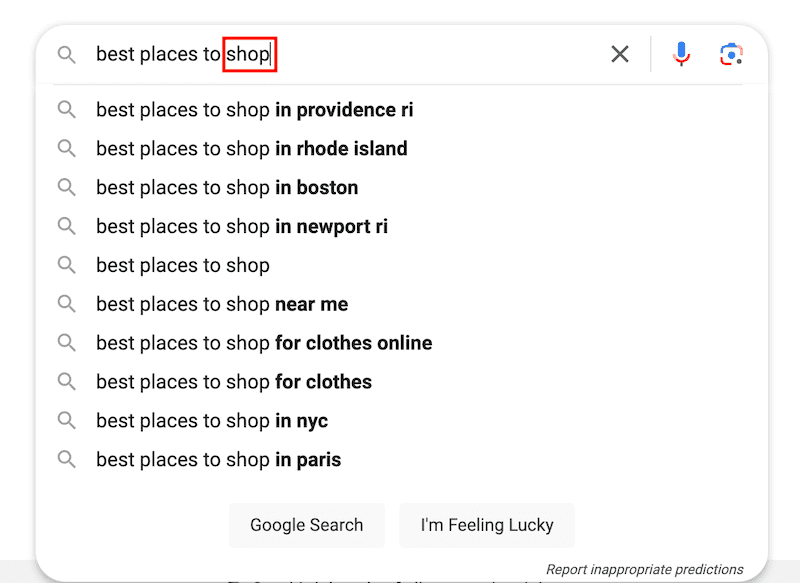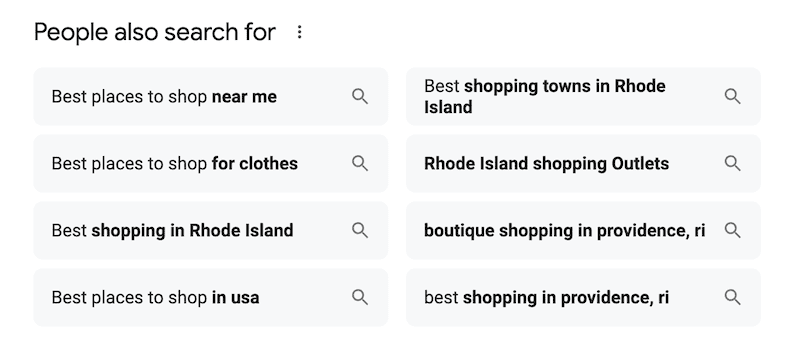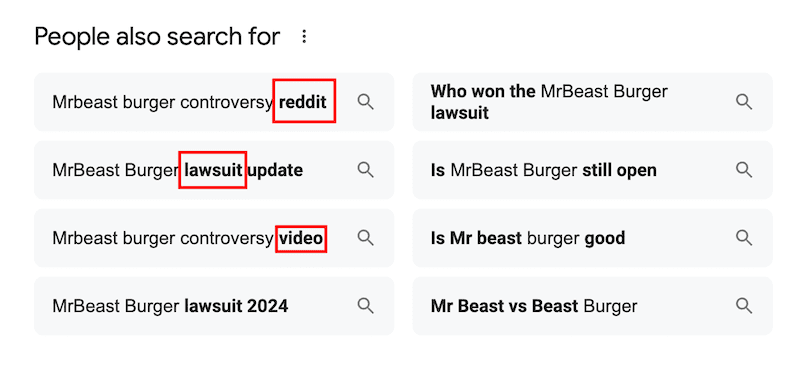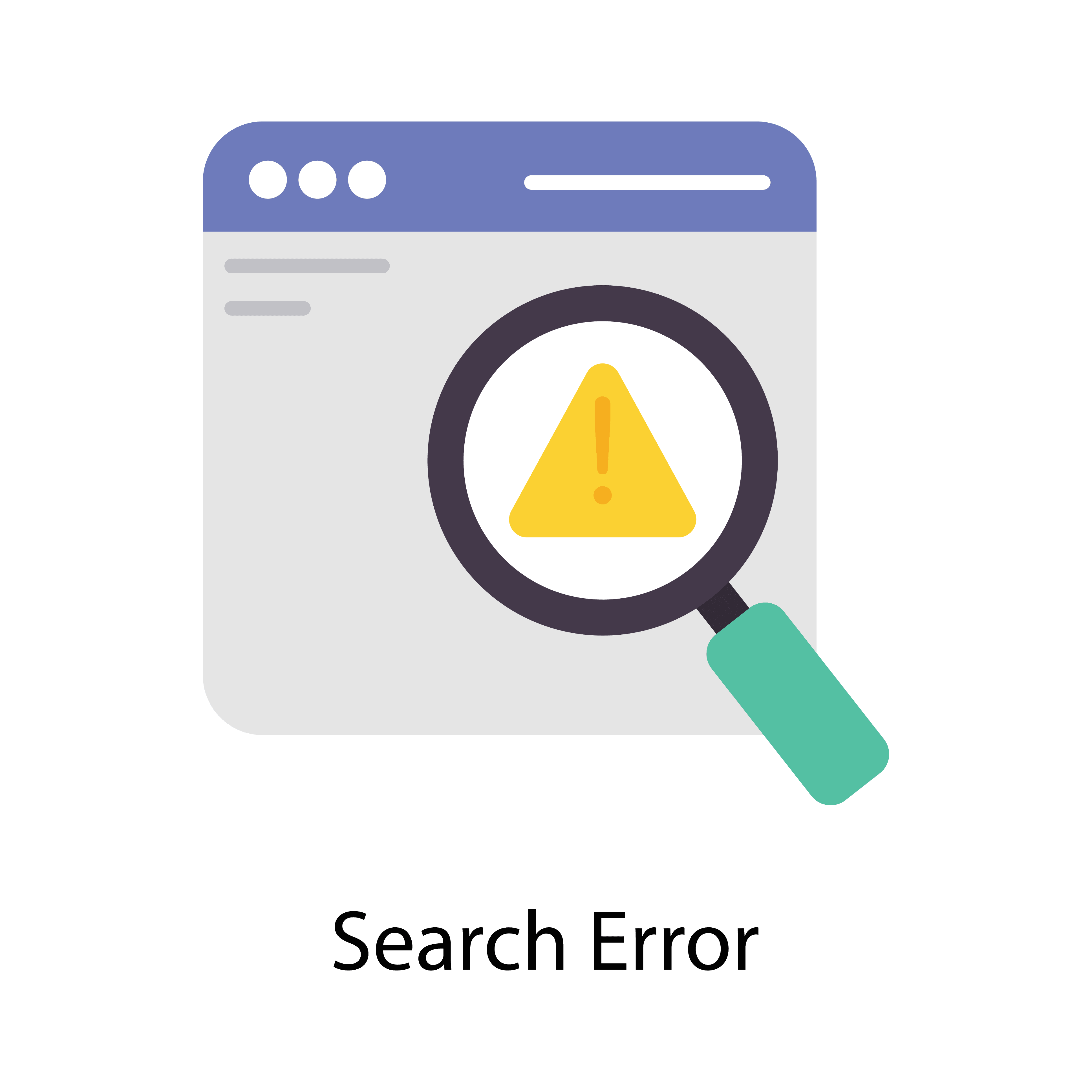How Does Google’s Predictive Search Affect Your Online Reputation?
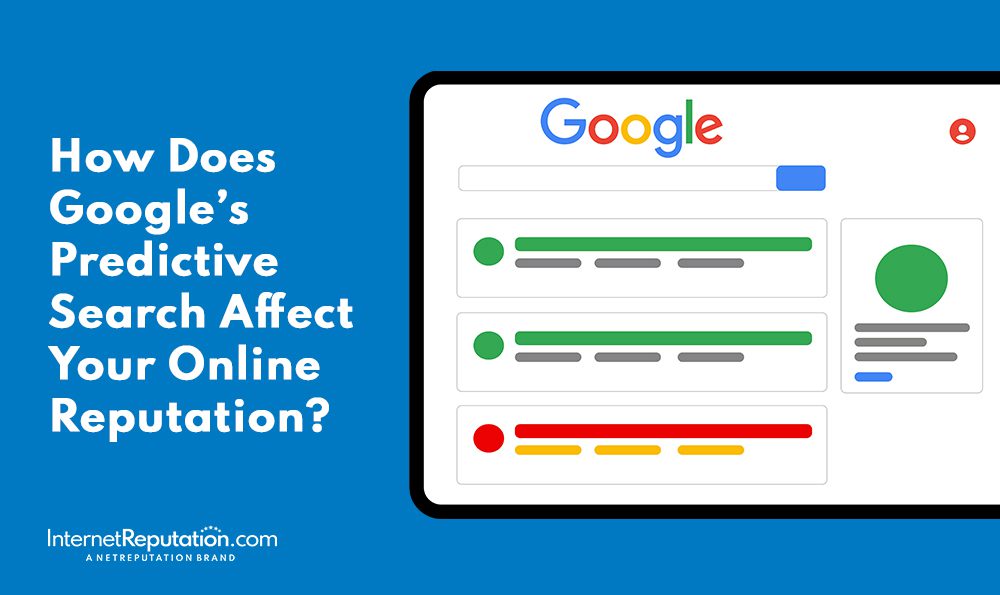
In this article, you’ll learn about predictive search in the Google search engine and how it impacts your online reputation.
Are you wondering what Google autocomplete — the search engine’s predictive search capability — is doing to your online reputation?
Google’s predictive search feature might make it easier for users to complete their search terms and save time. However, autocomplete can do serious damage to your online image, page rankings for a search query and even brand loyalty.
If you aren’t in control of your online reputation now, letting it go indefinitely will lead to issues that will become increasingly difficult to manage.
Read on to learn how Google autocomplete can harm your online presence and make it difficult to land a job, get a promotion or build the relationships you need to succeed.
Want to speak with an expert about your online reputation? Call us today at 941-259-4554.
How Predictive Search Works
Google autocomplete is Google’s predictive search function that considers popular searches and pulls from the search history of other users. By implementing predictive search, Google was able to make online searches faster and easier. According to Google, “Our automated systems generate predictions that help people save time by allowing them to quickly complete the search they already intended to do.”
When you start typing a query, Google will show suggested search options beneath the search bar. By clicking one of the suggestions, Google will automatically complete the query. You can see this search experience in action in the example below.
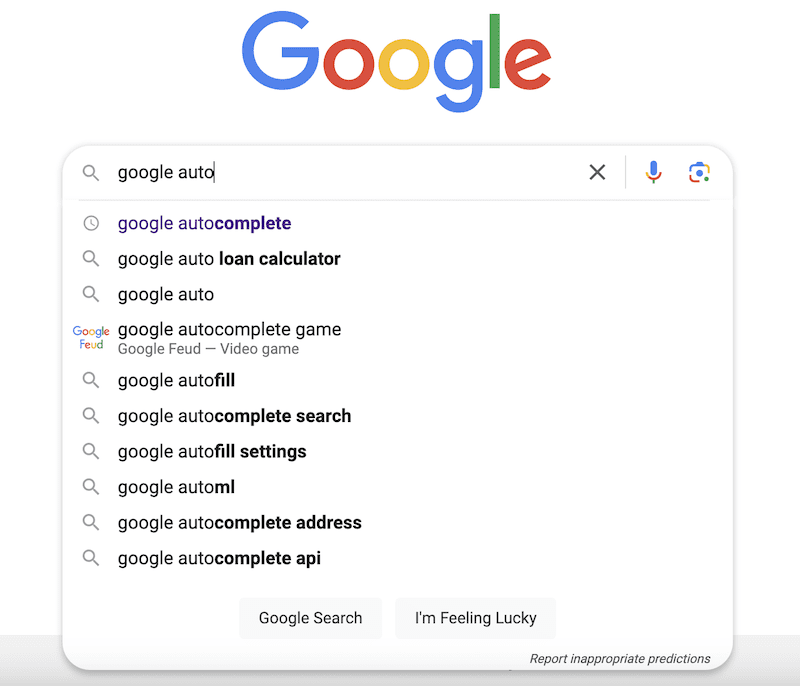
The autocomplete feature is available whenever you access the Google Search bar. Instant recommendations come in handy for completing the search and finding an answer quickly.
However, while predictive search may make queries easier to type out, some autocomplete suggestions can be negative and unflattering.
Bad results create an unwanted association with your name, make it difficult to achieve your business priorities, and point searchers toward results that strike at the very heart of your online reputation.
If you aren’t taking proactive steps to manage predictive search settings, you could feel the impact of negative autocomplete suggestions and popular searches for months or years to come.
How the Autocomplete Algorithm Works
Once you start typing something into Google, autocomplete provides a drop-down list of suggestions to fill out your search. These suggestions will change or adapt as the searcher continues typing to better match what they’re looking for.
For example, when I typed “best places to” in the search field, autocomplete suggested search terms related to dining:
However, once I added the word “shop” to my search, the suggestions updated:
The auto-suggest algorithm fills out searches for your name based on five main factors:
- How often the keyword is searched
- Where the user is located during the search
- The time of day the keyword is searched
- Your footprint on popular social sites
- Each user’s unique search history
What do these predictive search results mean for you and your personal brand?
Different users may find slightly different predictions and search results based on who they are, their search history and where they’re located. However, just one bad auto-fill suggestion is all that’s needed to associate your personal or brand name with something negative.
When an employer, manager, coworker, or spouse follows that search engine suggestion and finds that bad result, that prediction gets stronger. The more people follow a negative autocomplete, the more likely it is to show up during future searches of your name on Google.
Even having the negative autocomplete show up can be enough to influence someone’s opinion of you, whether or not they click through to pages related to the search query or take time to dig into the issue further.
Related Searches in Google
Google’s related searches can be found at the bottom of the results page. Look under the heading “People also search for.”
These related search query suggestions populate based on keywords and phrases that are close to the original query. This section is intended to simplify a user’s search process and get them the answers and relevant results they need quickly.
Unfortunately, this section can mean that your name is combined with harmful or unwanted terms that can create real problems for your brand. By offering related search suggestions with negative meanings, additional search queries can continue to nurture an unwelcome and prevalent association with your name.
Related Searches and ORM
In terms of online reputation management, related searches can give you insight into other negative queries people are searching for and where they may be discussing your personal or professional brand in a negative light.
In the example below, the related searches can tell you that people are discussing the issue on Reddit, searching for information about a lawsuit and also looking for video content.
Nobody wants to have a poor online reputation. But accessing this type of information from Google can help guide your strategy for rehabilitating your online reputation.
Predictive Search and Online Reputation
Google’s predictive search suggestions and features can impact your online image and success in a variety of ways.
Negative news attracts more attention than positive news online. The typical user will be drawn to the negative queries in the autocomplete suggestions.
When bad predictive search suggestions and related searches arise when a user begins searching for information about you, your career, education, business success and personal relationships can be impacted.
Let’s talk about the possible outcomes of having negative autocomplete searches associated with your name.
Job Prospects
When Google autocomplete or related search queries have negative content, employers tend to take notice. They may develop a bad first impression of your name or work history that can land your resume in the human resources trash bin.
A majority of job recruiters use search engines to research candidates during the hiring process. And many employers won’t consider hiring you if they find negative information about you online.
Imagine losing your dream job or missing out on an incredible work opportunity because of one Google autocomplete result. It’s definitely possible, though.
Because so many people now rely on Google to screen candidates before asking them for an interview, one past mistake could be the very thing keeping you from the job you deserve. What may have seemed like a minor indiscretion at the time could be a major reason why Google predictive search suggestions are turning employers off and hurting your potential.
Career Advancement
What if you’re currently working for a company you love? You’re not necessarily safe from the harm that predictive search can cause your career. Let’s say you’re focusing on one of the following:
- Taking your career to the next level
- Asking for a raise
- Working for a promotion
Even though you may feel solid at your current job, nearly half of employers continue to check up on current employees to see if there’s any behavior they should know about. From looking at your social media accounts to Googling your name to see what shows up, you have to continue protecting your online reputation and potential matches to your name.
If negative information is found on the search results page or predictive search reveals negative trends associated with your name, there is a strong chance you won’t be on the career trajectory you want.
A manager or department head can use what they find to cancel that much-deserved next step in your career. A harmful Google search query or search result could even get you fired.
Whether you’re comfortable where you’re at career-wise or have your eyes set on something more, a damaging related search or auto-suggestion could be all your employer needs to put a stop to it all. It could mean the end of what may have otherwise been a life-changing opportunity.
Business Success
If you own a small business, chances are pretty good that your customers are using Google to research your brand. 90% of consumers now search for local businesses online. Plus, 8 out of 10 comb through review sites to dig up info on your operation.
What happens when an unwanted autocomplete suggestion or predictive search terms show up after users type in your name? Autofill text like “bad reviews” and “lawsuit” may be enough by themselves to create fear in the hearts of your customers.
When that person accepts that search bar suggestion and completes their predictive search, they’re likely to find damaging results. Maybe they’ll see the negative news item or post that sparked the predictive search suggestion in the first place.
Once they discover slanderous reviews or negative media coverage that reflects poorly on your brand, they’re 82% more likely to move on to your competitors.
Plus, the more people who come across those damaging items online, the more likely they’ll appear as Google search suggestions and relevant results in the future. This only cuts deeper into your reputation and your bottom line.
What’s more, over half of job seekers would reject a job offer from a business with a negative reputation. This spotlights the impact a bad predictive search can have on attracting customers as well as stellar employees.
Education
Are you applying to colleges or looking to further your academic career? You may want to Google yourself and clean up your online presence before moving forward.
College admissions officers are likelier than ever to Google potential candidates and weed out candidates during the selection process based on what they find. A prior mistake or youthful mishap could hurt your chance of acceptance if a reference to it shows up in Google predictive search.
In other words, a bad predictive search query could be all that’s standing between you and the quality education you need in order to be successful in today’s market.
The longer you fail to deal with the problem, the harder and more expensive it will be to clear bad predictive search options on Google. This means delaying access to quality academic opportunities months or even years down the road.
To speak with an ORM expert today, call us at 941-259-4554.
Personal Relationships
If you have a website, blog, or social media profile, you already have an online footprint. In that case, your personal information is already searchable. It’s also available to anyone with internet service. This includes the people you care about most.
What happens when your closest friend or favorite grandma types your name into Google? Is autocomplete pointing your loved ones toward something nice? Or is it offering suggestions and potential matches that reflect poorly on you?
If it’s the latter, you could be in an awkward position at the next Christmas party, neighborhood cookout, or date night.
A negative autosuggestion or related search doesn’t just look bad. It creates a stigma that’s hard to shake off, too. A bad autocomplete cultivates an unwanted association that not only affects your reputation but may also erode the connections and trust between you and those that matter most.
How To Influence Predictive Search Results
Changing Google predictive search results for your name or brand isn’t easy. Luckily, there are a few steps you can take to influence autocomplete, related search queries and even search results.
Remove Negative Content
Auto suggestions that include words like “complaints,” “lawsuit” and “arrest” don’t come out of nowhere. Bad predictive search terms like these show up and are strengthened by negative links, articles and review sites populating search results, and they’re unlikely to disappear as long as those items have high visibility on the web.
Removing or suppressing records of that prior arrest or court case may help mitigate the problem at the source, eliminating it from view and weakening a bad autocomplete prediction at its foundation.
Though not always effective, negative results removal is often a good place to start when tackling an autocomplete problem. Get in touch with us today to discuss content removal and suppression by calling 941-259-4554.
Build a Positive Digital Footprint
Building a more positive and robust digital footprint can be a powerful way to create an attractive online resume and influence Google to only show positive predictive search queries related to your name.
By developing and posting positive assets across the web, you’re working to fill search pages with items that showcase your attributes when your name is searched for.
Once you begin to own more of your presence in search, you may start to dilute the predictive search terms and related searches that are dragging your reputation through the mud.
Hire a Google Autocomplete Removal Team
Affecting autocomplete and improving your online reputation is a complex, time-consuming chore. With the right Google autocomplete removal team by your side, you can rest easy knowing your auto-suggest and related search problems are being handled by proven search professionals.
At InternetReputation, we provide the cutting-edge tools and technology you need to fix your autocomplete problem and create an online reputation you can be proud of. Our experts will approach your predictive search issues from every angle and work around the clock to ensure your online presence reflects well on you.
Contact us today at 941-259-4554 to learn how we can help with Google predictive search.
